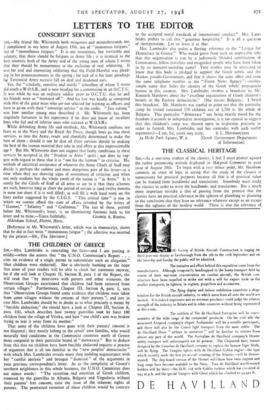THE CHILDREN OF GREECE
SIR,—Mrs. Lambrides is concealing the facts—and I am putting it mildly—when she asserts that " the U.N.O. Commission's Report . . cites no evidence of a single parent to substantiate such an allegation" (that children were abducted). She is obviously banking on the hope that none of your readers will be able to check her statement anyway, for if she will look at Chapter II, Section B, para. 1 of the Report, she will read that " by interviews with parents and other witnesses the Observation Groups ascertained that children had been removed from certain villages." Furthermore, Chapter III, Section A, para. 1, says that " Observation Groups found some evidence that children were taken from some villages without the consent of their parents "; and just in case Mrs. Lambrides should be in doubt as to what precisely is meant by "forcible abduction," she should have a look at Chapter III, Section A, para. 1(b), which describes how twenty guerrillas took by force 180 children from the village of Vrisika, and how " one child's arm was broken trying to tear it away from its mother."
That some of the children have gone with their parents' consent is not disputed ; they mostly belong to the rebels' own families, who would naturally find conditions in the Communist countries north of Greece more congenial to their particular brand of "democracy." But to deduce from this that no children have been forcibly abducted requires a process of argument that is all too familiar in the " new peoples' democracies " with which Mrs. Lambrides reveals more than nodding acquaintance with her "careful analysis " and brusque " dismissal " of the arguments in your previous correspondent's letter. As to the complicity of Greece's northern neighbours in this whole business, the U.N.O. Committee does not mince words: " The reception and retention of Greek children, removed by the guerrillas to Albania, Bulgaria and Yugoslavia without their parents' free consent, raise the issue of the inherent rights of parents. The protracted retention of these children would be contrary to the accepted moral standards of international conduct." Mrs. Lam- brides prefers to call this " generous hospitality." It is all a question of interpretation. Let us leave it at that.
Mrs. Lambrides also makes a fleeting reference to the " League for Democracy in Greece." Who would guess from such an impeccable title that this organisation is run by a judiciously blended combination of Communists, fellow-travellers and misguided people who have been taken in by its innocent-sounding name? Your readers may be interested to know that this body is pledged to support the Greek rebels and the Markos pseudo-Government, and that it shares the same office and even the same telephone number as the " Greek News Agency "—another simple name that hides the identity of the Greek rebels' propaganda bureau in this country. Mrs. Lambrides invokes a broadcast by Mr. Kenneth Matthews, about the " excellent organisation of Greek children's hostels in the Eastern democracies." (She means Bulgaria.) I heard this broadcast. Mr. Matthews was careful to point out that the particular camp he visited contained 170 children out of 1,700 in the whole of Bulgaria. This particular " democracy " not being exactly noted for the freedom it accords to independent investigation, is it too cynical to suggest that this children's camp was thrown open to inspection precisely in order to furnish Mrs. Lambrides and her comrades with such useful
arguments?—I am, Sir, yours very truly, S. L. HOURMOUZIOS
34 Hyde Park Square, W. a. (Greek Government Department of Information).


































 Previous page
Previous page